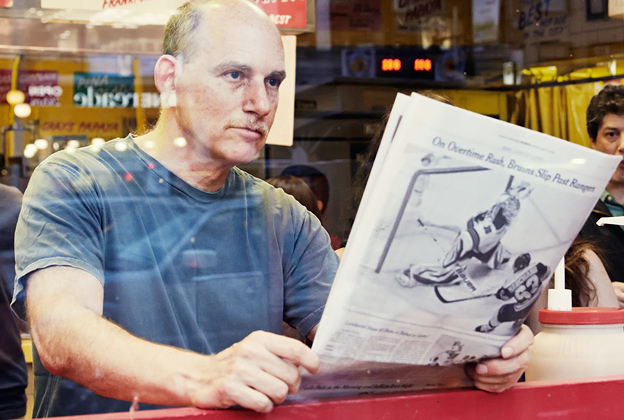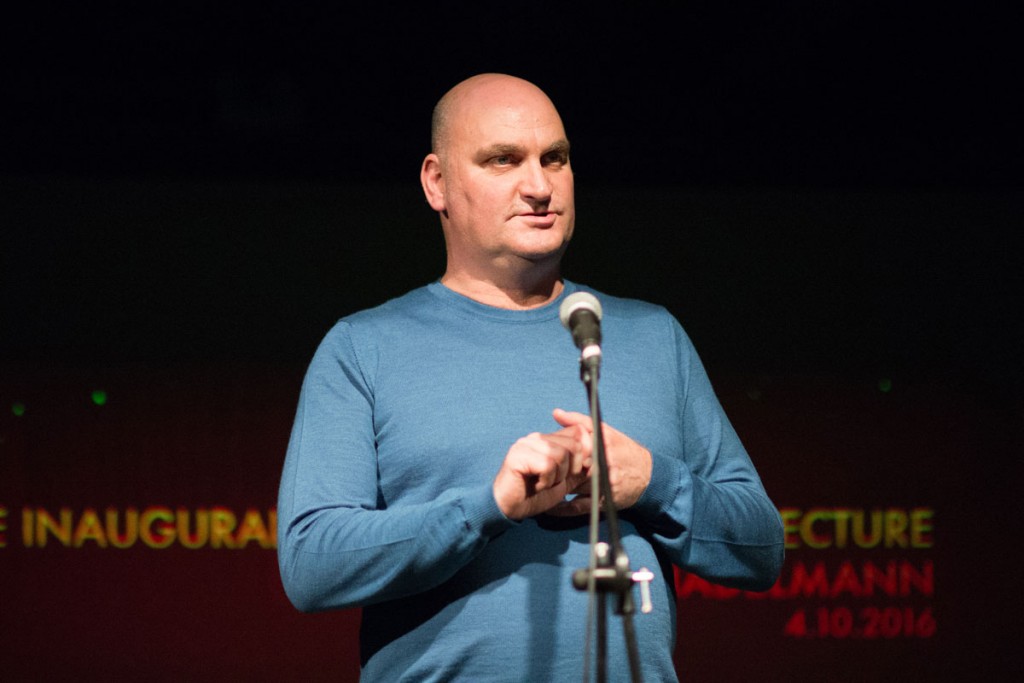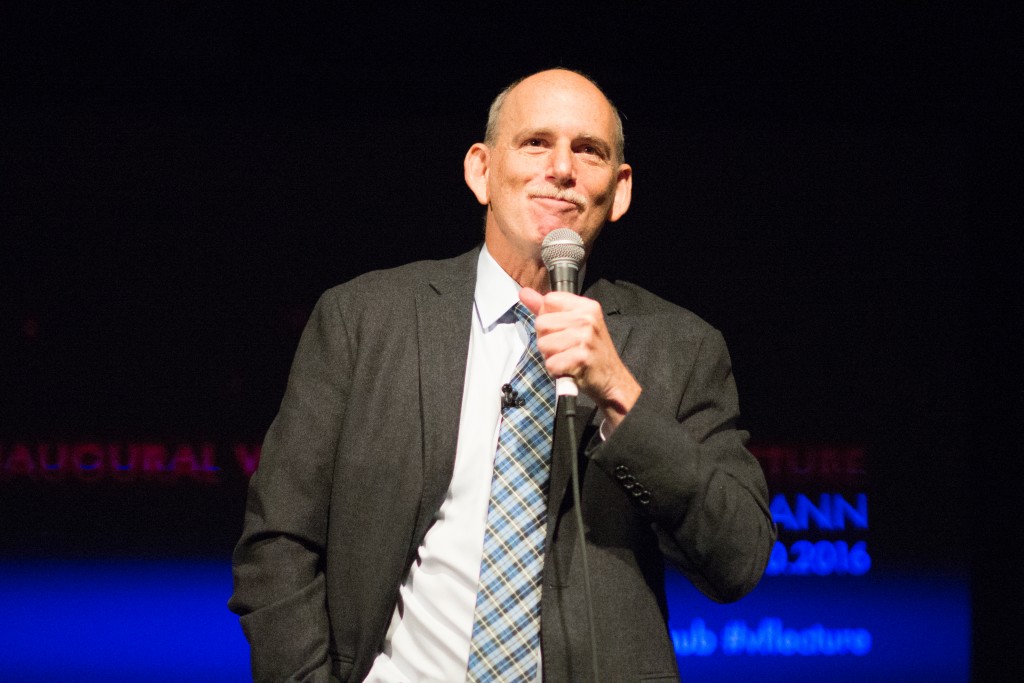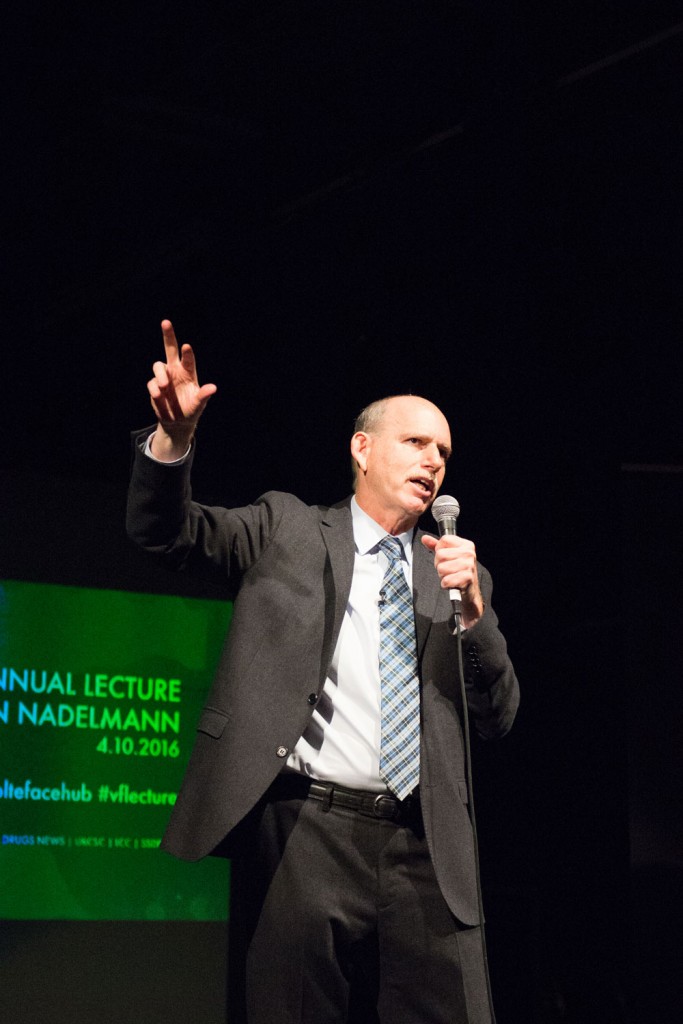On January 27th, Ethan Nadelmann – Executive Director of the Drug Policy Alliance and the man Rolling Stone called “the real drug czar” – announced that he was stepping down from the organisation he helped found some 17 years ago.
His announcement caused shockwaves throughout the world of drug policy reform, especially coming as it did just a week after the inauguration of Donald Trump as the 45th President of the United States of America, a man many saw as a potential threat to the progress of drug law reform nationwide.
Keen to find out why he chose this moment to step down, and to discuss his tenure at the DPA and his life in activism, I caught up with Ethan for what turned out to be a fascinating discussion on the past, present, and future of drug policy both in the US and abroad.
DS: Firstly, please could you give us an introduction as to how you got involved in drug policy and your journey up to now.
EN: I’ve been involved in drug policy since the early 1980’s when I first started studying it as a graduate student at Harvard around 1983. I was doing my law degree and PhD at Harvard and decided to write my PhD dissertation on the internationalisation of crime and law enforcement with a focus on drug policy. I ended up interviewing DEA agents throughout 19 countries in Latin America and Europe, and getting a security clearance and working as a consultant to the State Department’s narcotics bureau, then finishing that up and publishing it as a book called ‘Cops Across Borders.’
Then beginning in ’87 I started teaching at Princeton University at the height of the drug war days and all the drug war hysteria. In ’88 I wrote a few articles that attracted a lot of attention, and I kinda popped out on the scene together with the new Mayor of Baltimore, Kurt Schmoke, as kind of the leading critics of the entire drug war.
So I started speaking and writing in the late ‘80s and ‘90s, and in ’92 got a phonecall from a guy named George Soros inviting me to lunch and we made a nice connection. In ’94 I left there to start a drug policy think tank called the Lindesmith Centre as a research and policy advocacy institute within Soros’ new foundation, and I built that up for 6 years, co-started the international harm reduction development program, began to get Soros and other philanthropists involved in the ballot initiatives to legalise medical marijuana and to provide treatment as an alternative to incarceration.
Then in 2000 I spun that out of the Open Society and merged it with an organisation called the Drug Policy Foundation to create the Drug Policy Alliance. So for the past 17 years I’ve built up the DPA as the leading drug policy reform organisation in the country if not the world, to the point where we now have 70 people working in 7 or 8 offices around the country, mostly focussed on the US but with some international work.
You’ve recently announced that you’re stepping down as the Executive Director of the DPA, was there a specific time or event at which you decided that or was it more of a gradual thing?
It was something I started thinking about in 2015, and became increasingly clear to me throughout 2016. It was really a combination of personal and organisational developments. I think on the organisational side it’s, relatively speaking, the best, or the least bad time for me to make this transition.
You know it’s never easy when a founding Executive Director leaves an organisation, but I think at this point the DPA is quite strong: we have a strong funding base, very strong staff, our Chairman Ira Glasser has been with me since the beginning and is a position to manage this transition.
On a personal level I think some of it was having done this for 17 years as head of the DPA, and 23 years if you count back to when I first started the Lindesmith Centre in ’94. I think it was just a partial feeling of fatigue, I would say, combined with a desire to really pursue new opportunities and adventures.
In terms of the [drug reform] movement we really have come a long way. I feel like, when I got started on this, if you take the three major issues we work on – marijuana reform, sentencing reform, and treating drug use and addiction as a health issue, not a criminal issue – with respect to the marijuana issue the transformation has been most dramatic. When I started you had barely 25% of the general public favouring the legalisation of marijuana, now it’s 58%. We had zero states having legalised anything, now you have 28 states that have legalised medical marijuana, and 8 states that have legalised marijuana more broadly, and a number of countries outside of the US also moving forward in that direction, and we’ve been somewhat involved outside of the US as well.
In respect to sentencing reform, you know, the transformation has unfortunately been less dramatic, but apart from Trump and Sessions and a few other retrogrades in American politics, there’s now a fairly strong bipartisan consensus that there’s just simply too many people in American prisons, and that drug policy reform really has emerged over the last decade or so as the cutting edge of sentencing reform and efforts to address the mass incarceration problem.
And on the whole issue of treating drugs as a health issue, we led the way in the US around the efforts to enable the legal access to sterile syringes. We led those efforts in New York and New Jersey, California, and helped elsewhere over the last decade to try to reduce the problem of overdose fatalities involving heroin and other opioids.
So I feel like at this point, you know, the overdose prevention efforts have now been embraced across the political spectrum: even our Vice President Mike Pence was obliged to approve a needle exchange program in Indiana a few years ago when he was the governor and they were faced with a significant HIV outbreak among injecting drug users. So I feel like across all three areas we’ve accomplished a lot. There’s a long way to go obviously, but I felt that, for all these reasons, it was a relatively good time to hand off the baton, you know, we’re already into the second generation of drug policy reform, and I think it was a good time to hand off the baton.

Photo by Thomas Prior in Rolling Stone Magazine ‘Ethan Nadelmann: The Real Drug Czar’ (June 6, 2013)
You mentioned Trump and Sessions there – some people might see your timing as a little bit strange given the recent rhetoric from Trump and the threats against state’s rights from Sessions. It seems like we could be about to take a backwards step, has any of that given you pause for thought in terms of staying on at the DPA and trying to fight that yourself?
Well, as I said in my farewell letter, I had planned my departure and set the wheels in motion before the election, with the assumption that Trump would not be the President. So I did stop and think after the election, ‘do I want to shift gears?’, but at that point my feeling was that the variables that had caused me to say it was time, were still valid.
I mean the fact is that a lot of our work takes place at the state level, and with respect to the marijuana issue the momentum is so substantial at this point. You have a rapidly growing marijuana industry which is going to be increasingly fierce in protecting its interests, we have overwhelming public support now for ending marijuana prohibition, so I think that whereas Trump and Sessions can throw a wrench into the works, they’re not going to be able to stop it. And I think my stepping aside will leave some vacuum, but there’s a lot of other people stepping up.
With respect to the other areas, around sentencing reform, a lot of that work happens at the state level anyway, so Trump and Sessions can slow the pace of reform by the ways in which they direct federal funding, and through creating a broader climate of fear in this country, but they’re not going to be able to reverse it. They will certainly slow the pace of reform at the federal level but sometimes when you have the kind of opposition that is beyond the pale, that creates its own set of opportunities. I think people are going to find ways to deal with that.
So in the end I mean obviously I was massively disappointed at the election result, and it was an odd evening for me because on the one hand, word was coming in that we were winning 8 out of 9 states. No other issue was on the ballot as much as marijuana, marijuana reform was on the ballot in 9 states, 5 of them about legalisation and 4 about medical marijuana. We ended up winning 8 of 9, and the DPA played a pivotal role in the California initiative, which was the massive one, and we helped in various ways in a bunch of the others.
But on the other hand, Trump’s victory, you know, soured the whole thing. It was difficult not just to express but even to feel much joy in all of the victories that night. But it was an example of the momentum though that we have right now, so I feel confident that it’s going to keep moving forward.
So what are your plans for the future? It’s very hard to imagine you just simply retiring and stepping back from public speaking entirely.
Well I know I’ll have more time but I’ll also have more opportunities to speak publicly and to write more. I mean as the head of DPA I’ve probably had to turn down the majority of the speaking invitations that I’ve received just because in terms of the demands on my time it didn’t make sense to accept a lot of these invitations.
In terms of my writing, I first became prominent in this area by writing significant articles back in the late ‘80s in foreign policy magazines, in the journal The Public Interest and the publication Science. I wrote a trilogy of three pieces that really made a significant difference back then, and I’ve been disappointed at my inability to write more in recent years. So I’m hoping I’ll be writing more, I’m hoping I’ll be able to sit down and write the book I’ve been meaning to write for many years, although obviously the focus of that is shifting over time.
I’m hoping I’ll be out there even more than I’ve been to date as a public speaker, I’m hoping I’ll be able to devote a little more time than I have in the past to drug policy reform outside my own country, and I suspect that I’ll end up speaking to issues that go beyond drug policy in ways that would not have been appropriate for me to do as head of DPA.
Looking back at your tenure as the head of the DPA, do you have any regrets? Is there anything you would have done differently given the chance, or anything you wish you had done but didn’t?
It’s a good question. I’ve said that my single greatest disappointment, which may be of less interest to an international audience, was in 2008, when we designed, drafted, and launched a ballot initiative in California – Prop 5 – that if we had won, would have been by far and away the most significant sentencing reform in the history of the country. We went into that with very strong public support on our side but were ultimately defeated by the California prison guards union and the California political establishment. So that probably represented the biggest defeat that I and the DPA have suffered over all our years.
I would say in terms of regrets, it’s hard to think of those. It’s been really a remarkable run, I mean in my own mind it really dates back to 1994, so not just DPA but back to the Lindesmith Centre. I always knew this would be a long and tough struggle, but I think that where we are now, especially on the marijuana issue, and to some extent other issues, was almost inconceivable back when I got started. I think that the transformation on the marijuana issue in many respects resembles the transformation on gay rights, that where we are in this country now was unimaginable to people back in the late ‘80s or early ‘90s, and even perhaps more recently than that. So I don’t think I have major regrets, no.
Obviously on the flip side of that, there are a great number of achievements you can say you’ve been involved in, but is there one in particular that stands out as your proudest moment?
Well the funny thing is that I have both pride and regret about the role of marijuana reform. I have a sense that in terms of the perception of the role I’ve played and my legacy, that even though marijuana reform probably only represented about a third of our work, and a third of my work, it’s the one with the most dramatic transformation. It’s the one that has probably got the large majority of the headlines, it’s the one where our success has been the most dramatic, so I’m immensely proud of that but also regret somewhat that it’s overshadowed some of the other work.
And for me, the thing that’s given me the greatest pleasure, and in some respects the greatest pride, has been really playing a significant role in helping to birth and build and weave together a drug policy reform movement. What I love about our DPA annual conferences is that it’s bringing together people from across the political spectrum, who come from across the drug law spectrum, by which I mean everything from law enforcement officers who’ve served 30 years in drug enforcement and now feel that this was the wrong way to go, to people who spent decades behind bars on a non-violent drug charge and are now engaged in reform. And also people across the drug use spectrum, by which I mean people who have benefitted enormously from their use of cannabis, psychedelics and even other substances, as well as people who have had their lives devastated by drug use, and who are embracing sobriety and are in recovery.
To build a movement that includes all of these people, people from left, right, and centre, and from time behind bars, and putting people behind bars, and people who love drugs… you know sometimes I’ll say – who are the drug reform movement? We’re people who love drugs, people who hate drugs, and we’re the people who don’t give a damn about drugs. But every one of us believes that the war on drugs is not the right way to deal with it. And that weaving together of a movement is the thing that I’ve really I think taken the greatest pleasure and pride in.
Do you think there’s a risk that because marijuana reform has obviously been the most publicly visible issue, that maybe if we reach a tipping point where marijuana is legalised, that some of the momentum could fall out of the wider drug policy reform movement?
It’s definitely a risk. I mean obviously it looks different in the US than elsewhere because in the US the challenge of mass incarceration is so extraordinary, really unparalleled almost anywhere in the world, so that issue looms enormously large.
Marijuana is increasingly becoming legalised, especially in the US where its momentum is more rapid than in most other countries, and it is going to take away some of the momentum that we’ve had But I think we’re amply aware in this country that there’s this other monumental challenge and for most of us, including me and most of the people who work at DPA, as proud as we are of the transformations on marijuana policy, the thing that moves us and drives us more than anything else is trying to play a key role in ending mass incarceration in our own country.
Our core principle at DPA, and really in some respects the key principle of the broader drug policy reform movement, is that people should not be punished for what they put in their body absent harm to others. So uprooting the criminalisation of drug use and possession from our laws, from the popular psyche, that’s going to remain a driving force for DPA and for this movement for a long time to come. And not just in the US, I think that’s true internationally.
Definitely. I think one of the great strengths of the DPA is that it’s not simply focussed on cannabis and marijuana, whereas in other countries, including to some extent the UK, a lot of the drug policy reform organisations are pretty much just focussed on cannabis law reform.
I think that’s true, and I think the UK is a place where it’s been hard for folks to link cannabis reform with the other issue areas. I was impressed recently, when I visited you guys, I’d been in Stockholm and Oslo the month before, and I went from London after giving the Volteface lecture to Paris, and then to Geneva and Bern in Switzerland. And I have to say I’m impressed at some of the energy going on in Norway right now, I mean they’ve really peeled off from Sweden over the last 10 years and are really taking some significant steps in the direction of drug policy reform.
I’m impressed by some of the leadership in Switzerland, where there’s an embrace of drug policy reform writ large and a willingness to focus on cannabis reform but also the other pieces as well. I’m struck by Mexico, which is obviously in such a difficult situation right now, but I’m struck by some of the energy that’s going on there. Canada is a place where you have forward movement now, where activists have played a pivotal role and now the current Prime Minister Justin Trudeau is moving forward not just with cannabis reform and legalisation, but also with harm reduction.
The momentum does exist, but it is a challenge. I remember organising meetings in the US 20 years ago where people involved in marijuana reform, psychedelics reform, sentencing reform, harm reduction, civil liberties, libertarian conservatives, where it was relatively easy to bring together the leaders in each of these areas. The movement was small, the organisations were small, and it was all sort of intuitive why we needed to know one another. And as the movement has grown, what I see is that the people who are focussing on sentencing reform or racial justice may feel less connected to those working on the psychedelics issue, and not all that connected to those working on the cannabis issue, so there is a sense in which trying to keep weaving this drug policy reform movement together is going to continue to be an ever greater challenge.
But keep in mind also with the marijuana issue, we have one country down, and hopefully if Canada moves forward this year, 2 countries down, but 200 to go. And in the United States, on marijuana reform we have 8 states down and 42 to go. And there are parts of this country where marijuana legalisation is not on the political horizon, and where large numbers of people, particularly young men of colour, are continuing to get harassed and arrested and given criminal records, so we do still have a long way to go before we can feel that full victory is ours.
What do you think the future holds then for drug policy, both in the US and abroad, particularly in the UK?
Well in the US I think we need to focus on three things. One is that we really need to keep the ball rolling down the field on marijuana reform to make sure that it doesn’t slide backwards either because of the counter efforts by Trump and Sessions or because of mistakes on our own part. And for the DPA we also have a particular concern that in moving in the direction of legalisation we do it in ways that are socially responsible, and where some recognition and some amends are made to those communities that have been most devastated by the war on marijuana. In that respect the California ballot initiative – Prop 64 – was a major breakthrough in integrating marijuana legalisation with a framework more focused on.
I think with respect to harm reduction and public health, we still lag behind. I mean in much of Europe things like safe injection sites and prescription heroin have been going on for years, and we’re just beginning to get some traction in the US on advancing these issues. So we definitely have our future cut out for us.
As for outside the US, if you look at Europe there is this growing momentum on cannabis reform. You see it in Switzerland, the Netherlands could actually move forward to legalise via the back door, there’s stuff going on in Italy, a little bit in the UK, Denmark. I think that Europe was such a leader on harm reduction back in the ‘80s and ‘90s and that leadership persisted but not as dynamically into the 2000s. I think that Europe has kind of been sitting on its laurels in recent years, but I think that the challenge presented by cannabis reform in Uruguay and the US and Canada, as well as the broader dynamic debate over prohibition and legalisation that emanated from Latin America over the last 5 or 6 years, I think that has given Europeans a prod to start moving forward. So I feel optimistic that cannabis reform will move forward in a significant way in Europe.
On the other issues, I mean obviously Europe’s beset by so many problems right now, so the issues of drug policy reform are a relatively minor issue and that was reflected in the lack of dynamism coming from the European countries at the UN General Assembly Special Session on drugs in 2016. But I’m also pleased to see that it does seem like there are countries like Germany, and a few others in Scandinavia where you see them catching up with the more progressive governments in Europe on embracing harm reduction policies. So I think that’s going to move forward.
I think in Latin America, there you had this really interesting dynamic stimulated at first by the Latin American Commission on Drugs and Democracy beginning in 2009, and then by the Global Commission on Drug Policy beginning in 2011, and then by the leadership of presidents like Santos in Colombia, Molina in Guatemala, and Mujica in Uruguay, and that was sort of inspiring, but unfortunately because of changes in government some of that dynamic leadership in terms of stirring the debate dropped off a bit.
There’s some stuff going on in Africa, I was in both Tanzania and then in Kenya a year ago. There’s momentum in South Africa, there’s the West African Commission on Drug Policy started by Kofi Annan through his foundation, so there’s the beginnings of a significant conversation happening in Africa that obviously lags far behind Europe, the US and even Latin America, but I think is going to grow with time.
And then Asia obviously presents a significant challenge. You had that sort of breakthrough in Asia a decade ago where countries like Malaysia, Indonesia, Vietnam and China all began to accept methadone maintenance and to change in a small way to try and implement those policies in the midst of a very harsh prohibitionist policy. So Asia still has a ways to go.
So to go back to the UK, it does feel as though we are miles behind the rest of Europe even in terms of harm reduction and drug policy reform. Just last year we passed the Psychoactive Substances Act, which basically banned everything under the sun unless the government say it’s ok, which seems to me to be a massive backwards step, so I was interested in getting your opinion as someone on the outside looking in.
I’ll tell you I’m not a complete expert on all the details in the UK, but I would say that it is a huge step backwards. I remember when David Nutt resigned from being the government’s principle drug policy advisor, and you know the tragedy in the UK is that, even though there were moments, if you look at the Labour leadership they were never big advocates of drug policy reform, when the conservatives came in there was that momentary hope with Cameron that there might be something but that was quickly dashed. There’s a sense in which the sort of dynamism of the younger generation and its connection with drug policy reform has not been as powerful in the UK. Although it’s there, it’s just not at the same level of intensity.
There was some political leadership on drug policy reform in years past, I remember key politicos from Mo Molam to some others, you know even though Blair was never very good on this some of the ministers were relatively good. And quite frankly the opposition of the Tory government to harm reduction, and their much stronger preference for abstinence-only policy and tough prohibitionist policies of the sort that have been so demonstrably ineffective and costly, that just seems to reflect the kind of mean-spirited politics rather than a reflection of the more elevated ideals of the conservatives, and it also seems to reflect an abandonment of thinking about the role of government in terms of good cost-benefit analysis. Because there’s no question that some of these cuts to harm reduction services in the UK are essentially penny-wise and pound-foolish. And that’s going to land up sending things backward.
I think there’s going to need to be some younger political leadership coming through from across the political spectrum in the UK, and I think there’s some of that beginning to emerge, but I don’t see it penetrating the political establishment just yet.

Steve Moore (Director, VolteFace) introducing Ethan Nadelmann at the Inaugural Volteface Lecture. (Photo by Aline Aronsky)
Finally, do you have a message for the new generation of activists that are following in your footsteps? Any key lessons that you’ve learnt from your time at the DPA?
Sometimes activists think that activism is largely about just openly saying exactly what you believe the way you want to say it, but in fact effective activism is about being strategic, about being smart, about being focused. It’s about building coalitions even with people who you may disagree with on a whole range of other issues but recognising that you have a mutual interest in transforming drug policy, and that even when one may disagree upon the particulars, that it’s important to bring together people from across the political spectrum who are united in pursuit of this objective.
It’s going to take, obviously, some sophisticated leadership and focus on this issue. There are so many challenges ahead that it can be hard to prioritise this one, but I think the better that one can be clear about the negative consequences for the UK of persisting and building out a failed prohibitionist approach, and the clearer one can be about the benefits, both intellectually and politically, of moving forward with a reform policy. I think that’s what going to help open things up.
Having been in all this for many years what you see is that individuals who figure out how to advocate in the most effective ways can make an enormous difference. One never knows where leadership’s going to come from, I think some of my allies whether it’s Niamh Eastwood at Release, or Steve Rolles and Danny Kushlick at Transform, or the work that you guys are doing at Volteface, I mean you’re each providing effective leaderships, there’s some fair degree of coordination and common thinking, even though there are obviously differences there. But I think the question is how do you take it to the next level? How do you mobilise the financial resources to empower your efforts? How do you try to find ways to build political pressure through public opinion?
It was promising to see the way in which some of the UK media moved on this issue over the last few years. Even some of the tabloids began to back away from the drug war hysteria, and begin to push forward. So I think there are some promising signs there and I think that those things need to be really cultivated and advanced.
Deej Sullivan is a journalist and campaigner. He regularly writes on drug policy for politics.co.uk, London Real, and many others, and is the Policy & Communications officer at Law Enforcement Against Prohibition UK. Tweets @sullivandeej



